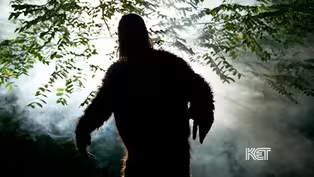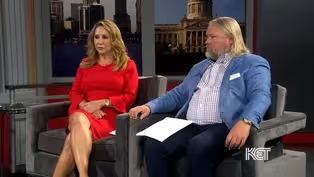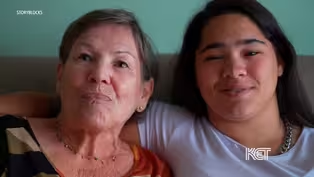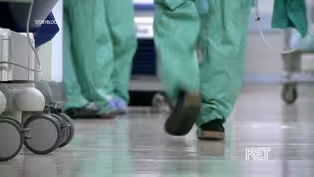
March 22, 2024
Season 2 Episode 212 | 27m 30sVideo has Closed Captions
A panel considers whether parents should have control over their child's medical records.
A panel considers whether parents should have total control over their child's medical records. A bill allowing pharmacists to vaccinate children aged 5 and older passes the General Assembly. How one Louisville family’s fight for treatment of an extremely rare disease is saving other lives.
Problems playing video? | Closed Captioning Feedback
Problems playing video? | Closed Captioning Feedback
Kentucky Edition is a local public television program presented by KET

March 22, 2024
Season 2 Episode 212 | 27m 30sVideo has Closed Captions
A panel considers whether parents should have total control over their child's medical records. A bill allowing pharmacists to vaccinate children aged 5 and older passes the General Assembly. How one Louisville family’s fight for treatment of an extremely rare disease is saving other lives.
Problems playing video? | Closed Captioning Feedback
How to Watch Kentucky Edition
Kentucky Edition is available to stream on pbs.org and the free PBS App, available on iPhone, Apple TV, Android TV, Android smartphones, Amazon Fire TV, Amazon Fire Tablet, Roku, Samsung Smart TV, and Vizio.
Providing Support for PBS.org
Learn Moreabout PBS online sponsorshipIs Kentucky on the verge of going nuclear?
If you're voting against this based on principle, you're cheating the children of Kentucky.
Plus, the debate over vaccines and who should be able to give them.
And then at home, the kitchen was like the center of the universe.
And a Kentucky author's culinary memoir celebrates Appalachian food and family.
Production of Kentucky Edition is made possible in part by the Cette Millennium Fund.
Good evening and welcome to Kentucky Edition on this Friday, March the 22nd.
We made it to the weekend.
I'm Rene Shaw.
Thank you so much for starting off your weekend with us.
Current Kentucky law allows miners to seek certain types of health care without notifying their parents, namely sexual health care, drug abuse treatment and mental health counseling.
But should parents have complete authority over their child's medical records?
That's the question posed to a panel of Kentucky senators.
Our Clayton Dalton has more as we start tonight's legislative update.
So I had some constituents that came to me because when their child turned the age of 13, they lost access to their medical records until the 13 year old physically came into the medical practice and signed a consent granting the parent access to the records.
House Bill 174 ensures that parents have access to their child's medical records until they turn 18.
The sponsor says doctors will still have the discretion to withhold records if they suspect abuse or neglect.
Senator Karen Burg, a Democrat and a physician, pressed the sponsor about how this bill could play out in difficult scenarios.
If you have a 16 or 17 year old woman who has been sexually abused by her father and is seeking treatment either for her mental health or physically, what will this bill do to her ability to keep her medical records private from her abuser?
I'm not a lawyer, but my understanding would be I'm assuming you're saying protect it from the person who was the perpetrator.
And I would think that the provider would see that as a risk of abuse or neglect.
Disclosing those records to the person she's saying committed those crimes.
So I believe they're protected.
The provider that medical provider is the one that you're going to say tells the family they don't have access to the medical records.
After we just passed a bill that said they do.
Kentucky Voices for Health, a liberal policy organization, says giving doctors discretion to disclose or withhold medical records from parents is too big of a burden.
This is another attack on our health care workforce.
We are already facing massive shortages in all kinds of health care providers, and this throws our providers into weird legal limbo.
And when when that happens, providers get killed.
When that happens, providers say, I throw up my hands, I call uncle.
I can't figure it out.
Planned Parenthood of Kentucky says they believe House Bill 174 could make minors uncomfortable sharing sensitive information with their doctors.
Kids are uncomfortable to have these conversations.
And now, you know, with a bill like this passes, we're going to have to disclose to minors under the age of 18 that all of your medical records, upon request of your parents, mental health, reproductive health, are going to be turned over to your parents.
This is going to create a chilling president.
But some Republican lawmakers see this as a parental rights issue.
And, you know, as a parent, I'm responsible for insurance.
I'm responsible for food.
I'm responsible for paying for the doggone health care.
And then someone tells me I may have a role in the decisions that my child makes.
Really?
Are you kidding me?
And the idea that just because my child might be doing something wrong, I don't get to know about it all the more reason I should get to know about it.
Because then I know and I can direct him in the way that he should go or she should go, because that's how I see fit.
And it is not up to anyone to tell me my child is someone can have some influence over my child in their health care without my involvement.
This is a this is a non-issue.
This is absolutely a yes vote for parental rights.
House Bill 174 passed out of committee along party lines and now heads to the Senate for a full vote.
For kentucky edition, I'm Clayton Dalton.
Lawmakers on that committee also heard the mom numbers, bill a sweeping piece of legislation to support mothers and children.
It passed with unanimous support and now also moves on to the senate floor.
The kentucky general assembly has adopted a bill to allow pharmacists to administer vaccines to children five and older.
Rural lawmakers say not every child has a pediatrician nearby, but a pharmacist might be much closer.
House Bill 274 passed unanimously on the House floor, but heard some opposition in the Senate today.
A few Republicans suggest vaccines can cause more harm than good.
A disappointing stance for some to hear.
But what if one kid gets affected because they had some allergy to an ingredient or they had some pre-condition they weren't aware of, but the doctor might have been aware of, their pediatrician might have been aware of, but that pharmacist might not have been aware of.
That's very easy to say.
Just get in your car and drive a few miles up the road.
If you think that way, then you don't really understand rural Kentucky.
You want to challenge it is to drive even five miles up the road.
If you're voting against this based on principle, you're cheating.
The children of Kentucky, particularly rural Kentucky.
And I can't begin to tell you how disappointed I am in this.
During the lockdowns and school closures of the COVID 19 pandemic, more children missed out on their routine vaccinations in Kentucky and across the globe.
Measles, mumps and rubella.
Vaccination rates among Kentucky's kindergartners did increase last school year, the first time since the pandemic.
Kentucky Health care workers could refuse to provide services that violate their conscience under a bill being considered in Frankfort.
State Senator Donald Douglas, a Republican from Nicholas Phil and one of the few doctors in the General Assembly, is the sponsor of Senate Bill 239.
That would apply to more than just doctors, nurses, clinics, hospitals, pharmacies, social workers and other medical service providers.
Senator Douglas says the bill is needed to help keep doctors in the state.
But some Democrats argue the bill does nothing to ensure that patients won't be harmed.
What this bill is meant to do is to restore some balance in our health care space for our health care providers by affording them some concrete rights and some ability to respond to the inconsistencies in medical practices.
We want them to know that they have rights and they are supported here in the Commonwealth.
This bill would allow someone in the health care space to refuse to provide treatment to a veteran because they had some sort of objection to the war that the veteran had served in.
I believe that it would allow a nurse to say, I'm not providing prenatal care to someone who has cancer, even via in-vitro fertilization, because I have a moral objection to that process.
There are no bounds and there are no guardrails.
Perhaps most concerning to me is the fact that there's not even a guarantee that patients won't suffer as a result of these health care provider choices.
The Kentucky Nurses Association opposes the bill, saying, quote, Freedom of religion is important, but religious freedom does not include the right to harm and discriminate against others, end quote.
On the other side of the debate, the Family Foundation applauds the legislation, saying, quote, No one, especially our frontline health care workers, should be forced to choose between their faith and their profession, end quote.
The full Senate passed the measure 29 to 7 yesterday.
It now heads to the House for consideration there.
Kentucky is one step closer to having nuclear energy.
There has never been a nuclear energy plant in the state.
But today, the General Assembly signed off on a new agency to help develop nuclear energy in the state.
Such as finding locations where a nuclear plant could be built.
The Kentucky Nuclear Energy Development Authority would work out of the University of Kentucky Center for Applied Energy Research.
Both chambers unanimously passed Senate Bill 198, with some reassurance from western Kentucky lawmakers that nuclear power would not get rid of coal.
And before I get started real deep on this, I want to explain this is in no way a competition to coal.
It is complementary to coal.
Kentucky is a coal state.
I work hard and we all work hard to keep it that way.
But there will come a time in the future that we will be looking for another baseload energy that is considered clean and this is just the preparing for that.
Republican Senator Danny Carroll of Marshall County introduced the bill years ago.
He helped remove Kentucky's ban on nuclear energy, which stood in place from 1984 to 2017.
Nuclear power does not emit greenhouse gases which trap heat in the Earth's atmosphere.
However, nuclear power does produce harmful radioactive waste.
Now turning to national politics, Congressman James Comer says impeachment might not be the way to go for President Joe Biden.
Comer, as chair of the House Oversight Committee, has been holding hearings into claims of presidential wrongdoing related to the president's son, Hunter Biden.
Democrats have been critical of the impeachment process, saying Republicans haven't been able to find any proof of a crime.
According to the Hill website, Comer says it might be better just to refer the case against Biden to the U.S. Justice Department.
The U.S. House today voted for a $1.2 trillion spending plan.
Without it, the federal government would shut down at midnight.
The vote was 286 to 134 and Kentucky's Republicans were split.
Hal Rogers, Andy Barr and Brett Guthrie all voted yes.
James Comer and Thomas Massie voted no.
The only Democrat in Kentucky's delegation, Morgan McGarvie, also voted yes.
The plan now moves to the U.S. Senate.
Time now to review some major developments in Frankfurt this week and what we're anticipating in the upcoming week with a pair of well-heeled Frankfurt insiders.
Government relations experts have Stephanie Bell with us and Jason Rainey.
Good to see you both.
Thank you.
Good to see.
You.
Hope you get some rest this weekend because next week, with just four days left before they take a veto period, is it going to be some high octane movement?
Is it not a late night for sure.
Stephanie, we'll just start there.
What do you think?
I mean, assess where we are right now and what we still have left to do or they still have left to do there?
Well, you know, they they have been meeting in pre conference for the budget and the revenue.
Well, I guess their revenue bill goes probably next week.
But they've been meeting and kind of mixing the two and getting their proposals together and negotiating and things like that.
But, you know, they have to get them out the door next week or they're going to be subject to governor's vetoes.
And so, you know, that's their goal, to get them out, get them voted on, get them to the signature for the governor next week.
So, you know, you've got a lot of parties that are lobbying for their for, you know, what they want.
The governor's one of those you know, he's trying to rally the troops to get some things that are important to him, like teacher raises, disaster recovery type things that the General Assembly is doing.
So, you know, all the groups are kind of getting together and trying to make that last minute push to get get get what they want in the budget or not or not.
Right.
I mean, you know, we would think maybe by this time there are some ideas that have very congealed around.
Right.
Like these are our principles.
This is what we will do.
This is what we will not do.
We think that perhaps that's where they are in the budget process.
And now it's just brass tacks.
Well, and it's it's interesting.
There's such a divergence in the Senate version versus the House version of House Bill one.
Right.
Lots of new projects included in there.
Some projects that are exciting for Kentucky.
Right.
One time use of moneys initiatives for University of Kentucky, Morehead State, NASA's space science up there, the Initiative for Excellence in Covington with the University of Kentucky right in queue.
Chase College law potentially moving down to the river front at the IRS site.
So there's there's lots of stuff, $100 million for revitalization for downtown Louisville.
Right.
Which is interesting.
Right.
Those kinds of things that get added in may drive conversations across the state.
Well, can my community could we have gotten that right?
Well, and that's right.
Is it and is it too late for those communities who are now hearing that there's a little pot of gold here, A little pot of gold there?
Can they get in on it at this particular point if they haven't already?
I think that's a that's a good question.
Right.
For Lexington, there's $10 million for affordable housing that's that's baked in the Senate version of House Bill one.
So it'd be interesting to see.
Well, if you don't ask, you don't get 100% of the time.
So, you know, people need to make that push.
I mean, things end up in the budget bill that you've never even heard of.
All the time right at the end.
And when you were in the free conference committee to define what Stephanie was talking about, anything is game right now, right?
Yeah, yeah, yeah.
One of the other things that was included in the Senate version is a $50 million pot of money economic development fund for the top 60 highest unemployment counties in Kentucky.
The top six, the tops 128.
Yes, that's interesting.
So, you know, I don't think there's a lot of there's a lot to be filtered out.
Right, with what that could look like.
But, you know, I mean, anything we're doing to try to increase job opportunities in Kentucky is a good thing.
Are those like HRC counties?
I'd say I'd say a lot.
Are right.
Appalachian Regional Commission County, So Eastern Kentucky counties, right?
Yeah, it could be across the whole state.
I mean, I might have spent this morning looking up, okay, where does my community that I represent for economic development, where do we fall in this?
Did we qualify?
You know, and it's nice.
I mean, that's a good initiative.
Yeah.
So so we'll see where all of that goes.
We know that other bills are moving or are not moving, Right.
Some high priority bills like House Bill seven that deals with autonomous vehicles, you know, that seem to have hit a wall here.
But it doesn't mean that it's completely stalled out.
But it's got to have a big push in the next four days, working days, that is.
Yeah, House Bill seven dealing with autonomous vehicles and regulation around that.
You know, it's had a lot of activity this session but it would be nice to kind of see where that's I mean we're running out of time right But as we continue to see folks leaning in on autonomous vehicle usage, we've got to figure out a regulatory framework for that.
Right.
There's a task force already for that.
But it passed last session.
Yeah, that's right.
And it was vetoed.
That's right.
Yeah.
And too late for.
Them to override it.
Yeah.
So it's interesting what what is different from the last bill.
That's the sticking point.
Right.
Yeah.
If, if more of the labor concerns are sticking more this time or what is it.
But we also know there are other bills.
You know, we're still waiting on the big die bill and there are some other controversial measures that are still being waited to have some finality on.
And so they could pass those when they come on the other side of the governor's veto period and just risk not being able to override it.
Yeah, well, I think groups are starting to recognize they need to get in the game on those type bills, bills, those type things.
Right.
I know there's several groups in Lexington that have kind of got mobilized to start making calls against those type bills.
And so, you know, this is the time they need to act.
Yeah, for sure.
Right.
What do you got your eyes on real quickly, what's the one thing you think?
Okay, this is going to make it.
I mean, I think how this this all gets filtered out, bringing the two budgets together in those versions, how do we reconcile the funding of seek in the formula around around the schools?
There's a lot of debate around that, obviously.
And, you know, how does that tie in with the teacher raises?
We were talking about that before we started recording, but that's something that I am super interested to see.
How does that really get nailed down?
Because right at the end of the day, we all care about teachers and the the education system.
It's key to everything we're trying to do to further the state of Kentucky.
It's just how do how do we get to that?
And, you know, one version, one one version of the bill has that nailed down where it's going to be in the part of the Sikh formula on the increase in the Sikh formula.
Yeah, and some say but that's still not fair, though, to some other districts.
Right.
And that Sikh formula is a very difficult yet complex formula.
Yeah, right.
And so certainly maybe that's a conversation that even happens again during the interim as they already started these conversations.
Do I think data privacy?
Yes.
You know, we saw a number of bills regarding data privacy and they haven't yet reached the finish line.
And, you know, we've been waiting kind of for the feds to to do something to make some parameters for states, but they haven't.
And I think that consumers are demanding that states do something to protect their data.
But, you know, of course, data is very valuable for companies, too.
So it's a very fine line for those bills because it's, you know, the groups that mobilize against these bills, if they're just one slight language and it brings a whole lot of people in.
And so I think data privacy I those ties have been discussed a lot but they none of them have reached the finish line yet.
Yeah.
So we'll keep our eye on it these these few few short minutes I go by fast.
I'm very well thank you both for keeping your eye on it and rest up for a busy week next week.
Thank you.
Thank you.
Join us Monday night for Kentucky tonight as we discuss money matters in Frankfort and how state lawmakers want to spend your money.
And we, of course, want your questions and comments.
Join us for that Monday night at eight Eastern, seven Central right here on KCET award winning literary giant Crystal Ball Concerned writes about the Appalachian experience in her books, poetry and essays in short stories.
Now, the former poet laureate of Kentucky has penned a culinary memoir, Praise Song for the Kitchen Ghosts, which explores the hidden legacy of black Appalachians through powerful storytelling alongside family recipes rooted in the past.
I talked with her about how the kitchen is the center of a family's universe.
I've heard you say this, or it's in your book where you talk about the kitchen being a place of power.
And so often I'll just speak from my personal experience when I think of the time that my grandmother spent in the kitchen toiling for groups and all of these different places and people, I looked at it as subservient and I looked at as almost a relinquishing of power.
Yeah, but you flipped that on its head.
Yeah.
I mean, I think, of course there were times when it was that because they were subservient in those household.
But when you look at it, they were also in powerful positions like what other power is there?
Then you have to rely on someone else.
Are you do you might not have to, but you do rely on someone else to provide your meals and so your sustenance right was this woman who was in the kitchen and making those meals what she even with instruction like even if you said you wanted whatever meat loaf that night, it was that woman who decided what kind of meat loaf you had, what quality that food was going to be.
And then at home, the kitchen was like the center of the universe, right?
It was like you got your hair done in the kitchen.
You know, there was a Bible.
You recited the Bible verses so you could make sure you was ready for for church.
People danced in the kitchen, right?
You heard the gossip in the kitchen.
The secrets that were kept from the men happened in the kitchen.
So it was the center and still is for many women, the center of the universe.
You can see my full interview with Crystal Wilkinson on Connections this Sunday morning at 11:30 a.m. Eastern, 1030 Central right here on KCET.
A few weeks ago, we brought you the story of Robert Vise, an eight year old boy from Louisville, who is fighting an extremely rare disease.
It turns out the treatment Robert is receiving today is all because of another Louisville family who first advocated for the treatment of this illness.
Nearly 30 years ago, our Kelcey Starks brings us the incredible story of Mark Dad, who was told his son wouldn't live past ten years old, and today he's 35.
I can remember laying on the floor at night next to Ryan's bed thinking this probably won't come in time for Ryan.
But what we're doing today will change the generations from generations forward.
We will change those lives we'll never meet.
That's what devices are doing.
They're changing things for Robert, but they're also changing the future for children they'll never meet, for families they'll never know of when they're diagnosed.
They'll hear your son or he has or your daughter has more kill syndrome.
But there's a treatment, and it really works well in parentheses.
There's Helen and Bobby and Robert and his sister that they'll never know.
And their friends, they're changing tomorrow for all these families.
What an incredible gift.
And could you have ever imagined?
No.
You know, my my real job back in Texas was I was a police officer for 32 years.
You know nothing about science.
What does that have to do with finding a treatment?
You can't as a police officer, but you can as a dad.
You can as a mom and you can as a friend.
I was in Germany once a few years ago, speaking at a conference in mines.
It was at a hospital and the director of the hospital said, I want to show you our infusion lab.
So we went down the hall on another floor and I walked in and there were four or five little children walking around pushing IV poles.
They were getting I.V.
infusions of all different types of drugs.
And I looked on the label of one of them, and it said Elder design.
That's right.
This drug, that moment I pictured all the people in Dallas who gave up their personal wealth.
They gave so many hours of their personal time to help that little girl they'll never meet.
We're seeing a poll that said Elders.
I read it.
She looked up at me and she smiled and she walked on with her life.
It was one of those moments that I'll never forget because I picture the people in Kentucky and in Texas and across the nation who said, I won't give up on her.
On the next episode of Inside Louisville, hear the inspiring story of how these two families worlds collided and how they're changing lives around the world because of it.
Join Kelsey Starks this Sunday on inside Louisville at 12 noon Eastern, 11 a.m. Central right here on KCET.
Some dancing, some dining and how you can look for Bigfoot without leaving Kentucky.
Our Toby Gibbs looks at your entertainment options around the Commonwealth.
Finding Bigfoot is no small feat, but if you want to give it a try, get down to Lawrenceburg tomorrow for their great Bigfoot quest.
Join paranormal investigator Jeff Wooldridge in a top secret area that's notorious for Bigfoot sightings.
If there's a big foot in the bluegrass, you might find him this weekend.
Louisville Zoo's popular Lantern festival Wild Lights is back for its fifth year starting tomorrow.
Follow a winding path through the zoo to experience over 60 handcrafted displays depicting nature, coral reefs and Chinese mythology.
There will also be interactive elements and cultural performances to experience.
Wildlife is open on select nights through May 19th and will be open every night of the Jacobs Spring break.
The World Ballet Company and Orchestra Kentucky are coming together tomorrow for a one night only performance of the iconic Swan Lake Ballet.
Witness the perfect pirouettes and magical music, as well as the hand-painted sets and over 158 radiant costumes.
This is the perfect event to dip your toes into the world of ballet, or just to see one of the classics like Cumberland Children's Theater presents Radium Girls The true story of young female laborers who were fatally poisoned at their workplace.
Set in 1920s New Jersey, this gripping drama follows the story of three girls who work in the U.S. radium plant and start to realize that their growing health issues are related to the paint they use.
The first show is tonight, but don't worry if you can't make it.
There are shows on Saturday and Sunday as well.
The tastiest week in Corbin kicks off on Monday.
Restaurant Week is returning and over a dozen local restaurants have concocted a culinary treat for you that won't break the bank.
Whether you're a local looking to expand your favorites or a tourists looking to taste.
What's so great about Corbin Restaurant Week is sure to be an appetizing event.
And that's what's happening around the Commonwealth.
I'm Toby Gibbs.
A lot of great stuff happening.
Thank you, Toby Gibbs.
Go out there and make it a great weekend and we hope to see you Monday night here at 630 Eastern, 530 Central for Kentucky Edition, where we inform, Connect and Inspire.
Connect with us all the way as you see on your screen there to stay in the loop.
And also look for us on the PBS video app on your mobile device and smart TV.
Thanks for being with us this week.
Have a great weekend and I'll see you right back here Monday night.
Take good care.
Around the Commonwealth (3/22/2024)
Video has Closed Captions
Clip: S2 Ep212 | 2m 21s | A look at the events happening around Kentucky. (2m 21s)
Family Advocates for Treatment of Rare Diseases
Video has Closed Captions
Clip: S2 Ep212 | 2m 35s | Lives saved thanks to Louisville family advocacy for treatment of extremely rare disease. (2m 35s)
Inside Kentucky Politics (3/22/2024)
Video has Closed Captions
Clip: S2 Ep212 | 7m 52s | Inside Kentucky Politics with Stephanie Bell and Jason Rainey. (7m 52s)
Parental Rights and Minor's Medical Records
Video has Closed Captions
Clip: S2 Ep212 | 4m 29s | Panel considers whether parents should have total control over child's medical records. (4m 29s)
Pharmacists Allowed to Vaccinate Children Under Bill
Video has Closed Captions
Clip: S2 Ep212 | 1m 25s | Bill allowing pharmacists to vaccinate children 5 and older passes the General Assembly. (1m 25s)
Right of Conscious Lets Doctors Refuse to Provide Services
Video has Closed Captions
Clip: S2 Ep212 | 2m 2s | Bill would allow doctors to refuse to provide services that violate their conscience. (2m 2s)
Providing Support for PBS.org
Learn Moreabout PBS online sponsorship
- News and Public Affairs

Top journalists deliver compelling original analysis of the hour's headlines.

- News and Public Affairs

FRONTLINE is investigative journalism that questions, explains and changes our world.












Support for PBS provided by:
Kentucky Edition is a local public television program presented by KET





